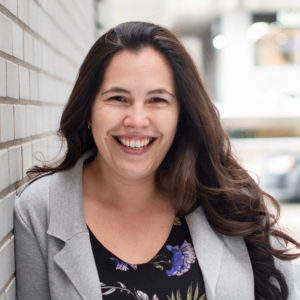KRIS ARCHIE
The Circle on Philanthropy and Aboriginal Peoples
Executive Director
Vancouver, British Columbia
PLACES 2016 Cohort
 From a very young age, Kris Archie learned from her mom that giving was not something one did just a few times a year. It was embedded into their way of life.
From a very young age, Kris Archie learned from her mom that giving was not something one did just a few times a year. It was embedded into their way of life.
Archie, a Secwepemc and Seme7 woman from the Ts’qescen First Nation, was raised by her single mom off of a reservation in the small town of 100 Mile House, located in the South Cariboo region of central British Columbia, Canada.
At home, she said her mom had an open-door policy for people who needed a little extra help.
“I have memories of my mom coming home and bringing someone who experienced homelessness or women fleeing domestic violence and we always had a meal for them,” she said. “Our home was always a welcoming place for people to be.”
Looking back, Archie says she is in awe of her mother, a single woman with three children who really didn’t have much to begin with.
“That instilled in me a sense of gratitude and abundance,” said Archie. “There was always enough to have someone else around the table and it was important to demonstrate that.”
Why did you get into philanthropy?
I got in kicking and screaming. I had been a consultant for several years doing work to support organizations. I kept running into this fellow I knew who was the director of a local community foundation. He kept telling me, “You’d be fantastic.” I was like, “No way.”
He kept telling me how they would benefit from my involvement and I was pretty resistant. I was enlisted to help them on a homeless initiative and to rebuild a completely new strategy to help them rethink what that work could look like.
I was able to bring in my lived experience as someone who had been in foster care and who has been a foster parent, and my pas- sion for legislative change all into this space. What really struck me was that I had the opportunity to work with others and with the financial resources to fund this work in communities.
You were a PLACES fellow. What was that experience like and how has it impacted your work?
It fundamentally shifted how I see the world. I was given the tools and the leadership skill-building to activate my sense of power.
It seemed many of our visits coincided with some sort of state violence — such as a black man shot by police — and we would be devastated. This is the world we’re living in and this is the space I could bare my soul and let my grief breathe.
I remember [PLACES facilitator] Bina Patel telling us, “This is tough, sad and horrifying, but we have work to do here. We have to wipe our tears and be prepared to walk into the boardroom and build equity.” And there was something really powerful in that. I really appreciated that. That was transformative for me because I can feel the pain of the world and still get my work done.
What is one of the biggest challenges you’re facing right now in this work?
I get really anxious about how quickly the language of this learning is co-opted and therefore losing its meaning. I’m hearing more organizations in Canada talking about diversity and inclusion, but they can’t have a conversation about race, white supremacy and Indigenous communities.
I find myself trying to suss out whether the person is saying these words because they’re the right words to use, or are they prepared to do the work to make these words come to life?
One of the challenges quite specific to Canada is this rhetoric around reconciliation about past wrongs to Indigenous people. There’s a missed opportunity for remembering that the word gives us a path- way to shift what is possible for the future of this country in an age where people just want to check off boxes and pat themselves on the back.
If folks aren’t serious about working through their privilege and power, if they can’t have that conversation at their dinner tables and where they live and work and play, building equity isn’t actually going any- where. That’s the work.
If you could write a very short letter —“Dear People In Philanthropy…” What would it say?
Dear People in Settler Created Philanthropy,
It’s time for folks to come clean on whom and on whose land their wealth is built on and to find opportunities for reparations.
Consider taking your lead from Indigenous world views because Indigenous people from the beginning of time have had a relationship with reciprocity and giving and the land.
If you’re in this space and you want to do better, move out of the way and let Indigenous people and people of color take the lead and relinquish power. The real solutions for some of the biggest social issues will be led by Indigenous organizations and Indigenous people.
Is there an internal question you’re constantly asking yourself while doing this work? What is it and how do you answer it?
Am I in right relationship here? It means, have I done the work to take care of my body and mind to be fully present here and now? Am I in good connection with my family? Am I in the right connection to my community in order to make deci- sions about philanthropic behavior?
When I find myself feeling shaky or having to give some feedback, this helps me get really grounded in my deepest sense of purpose. And it helps me weed through the noise of, “What is the right thing to say? What is the polite thing to say?” It offers me a moment of clarity.
